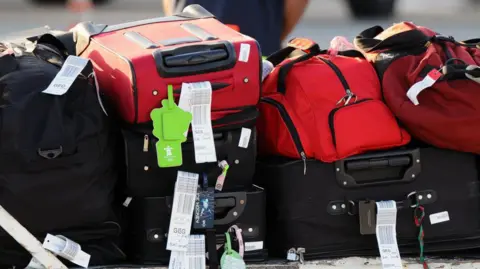In the evolving landscape of air travel, additional fees associated with baggage have emerged as a revenue stream that has attracted significant attention. According to reports, airlines in the United States alone generated a staggering $7.27 billion from check-in luggage fees in the previous year, a notable increase from $7 billion in 2023 and $5.76 billion in 2019. As budget airlines have proliferated, traditional carriers have adopted similar fee structures to remain competitive. This shift has not only angered consumers but has also ignited discussions among politicians and advocacy groups regarding the implications of these so-called “junk fees.”
Budget carriers were the pioneers in introducing baggage fees, starting with the UK’s FlyBe in 2006, which charged £2 for pre-booked luggage and £4 for on-the-spot check-ins. This model quickly caught on, leading major carriers like American Airlines to adopt similar practices. By 2008, American Airlines charged $15 for the first checked bag on its domestic routes, marking a pivotal moment in the airline industry’s approach to pricing transparency. Industry experts like Jay Sorensen from IdeaWorks note that traditional airlines felt compelled to add these fees as they confronted rising competition from these low-cost carriers.
Consumer sentiment surrounding these additional charges has been overwhelmingly negative. Take Lauren Alexander, a 24-year-old traveler from Boston, who described the surcharge for luggage as “ridiculous” while standing outside Toronto’s downtown airport. She expressed frustration over being informed that her inexpensive ticket would incur an extra cost of around $200 (£148) for baggage—ultimately opting for a small backpack to avoid the fee. Similarly, fellow traveler Sage Riley echoed her feelings, indicating that the supplementary charges can be excessive and burdensome.
Past practices in air travel often included checked bags, seat selections, and meals as part of the standard fare. However, as the market has evolved, many air travelers now seek to reduce costs by opting for carry-on luggage instead. Witnessing the upward trajectory in sales of smaller suitcases that comply with airline size restrictions, companies like Antler have seen substantial growth in demand. Kirsty Glenn, managing director of the UK luggage firm, reported a spike in online searches for compact luggage solutions, illustrating the shift in consumer preferences.
The social media landscape has also contributed to this change, with influencers and travel journalists creating content that pivots around luggage that adheres to airlines’ regulations. Travel expert Chelsea Dickenson has amassed nearly a million followers on TikTok by publishing videos focused on practicality regarding baggage allowances and travel packing hacks. Dickenson noted the sheer effectiveness of comparative content proving popular as viewers gravitate toward finding the best fit within carried limits.
Despite the profit potential of baggage charges, contentious issues arise concerning the pursuit of ancillary revenue through hand luggage fees. Airlines like Ryanair have restricted free cabin baggage to small items that fit under the seat, forcing passengers to pay for additional luggage. This has sparked backlash from consumer advocacy groups such as BEUC, which lodged a complaint against these practices, invoking a 2014 EU ruling that mandated reasonable conditions for hand baggage without extra charges. As definitions of “reasonable” remain vague, this has set the stage for further regulatory scrutiny.
In contrast, outside of North America and Europe, some airlines like India’s IndiGo have rejected extra fees altogether, emphasizing operational efficiency over supplemental income. Their CEO, Pieter Eibers, stated that they prefer to avoid disputes over baggage weight or size, which aligns with their ethos of expediting on-ground turnaround times.
Overall, the current dynamics within airline pricing reveal a notable shift towards customer awareness and sentiment concerning ancillary fees. As these charges continue to swell, increased scrutiny from regulators, mixed reactions from consumers, and evolving marketing strategies for baggage may dictate the future of air travel economics. The ongoing debate about the fairness and transparency of airline pricing practices reflects broader concerns within the industry and highlights the delicate balance between profitability and customer satisfaction.











